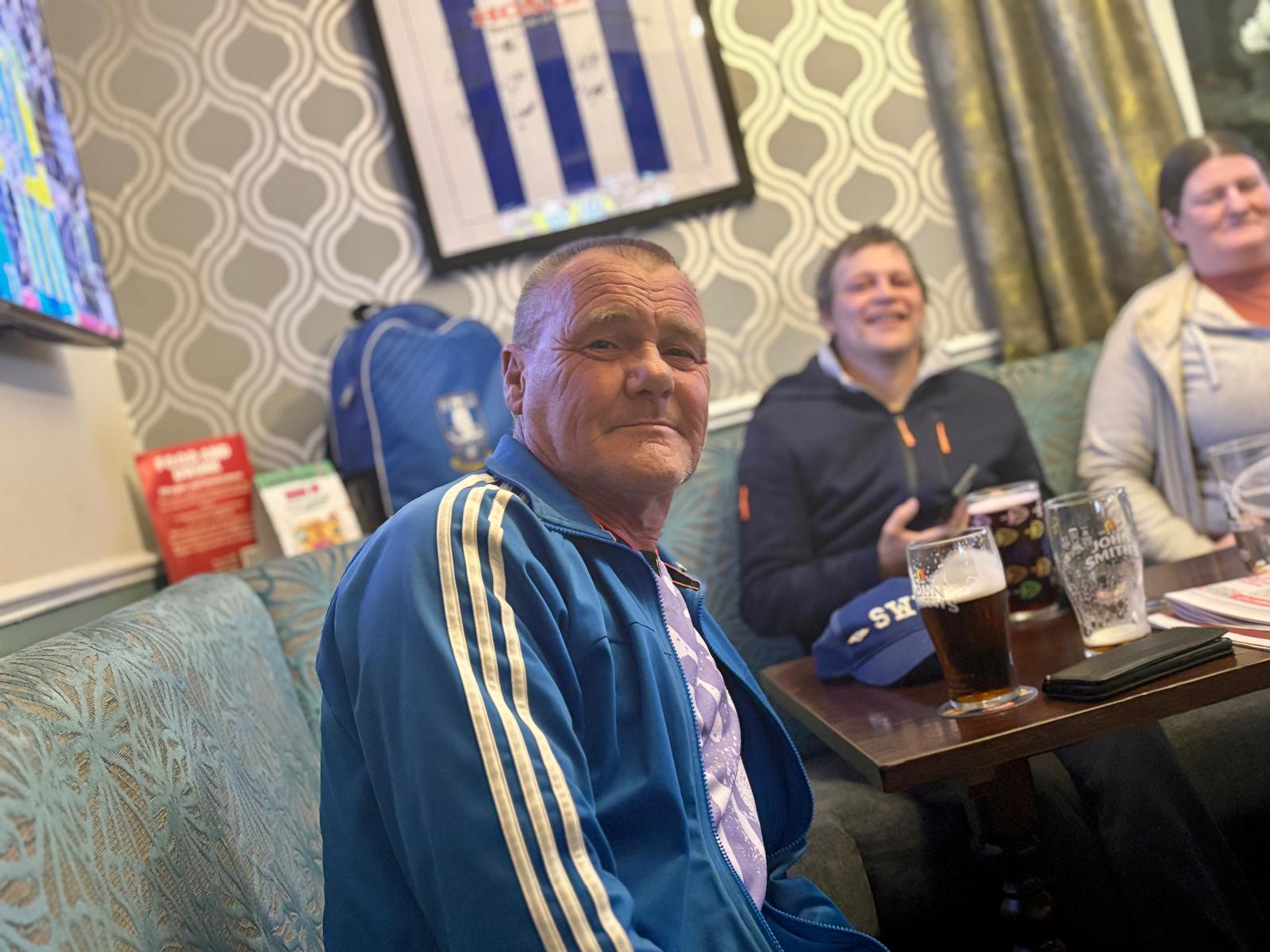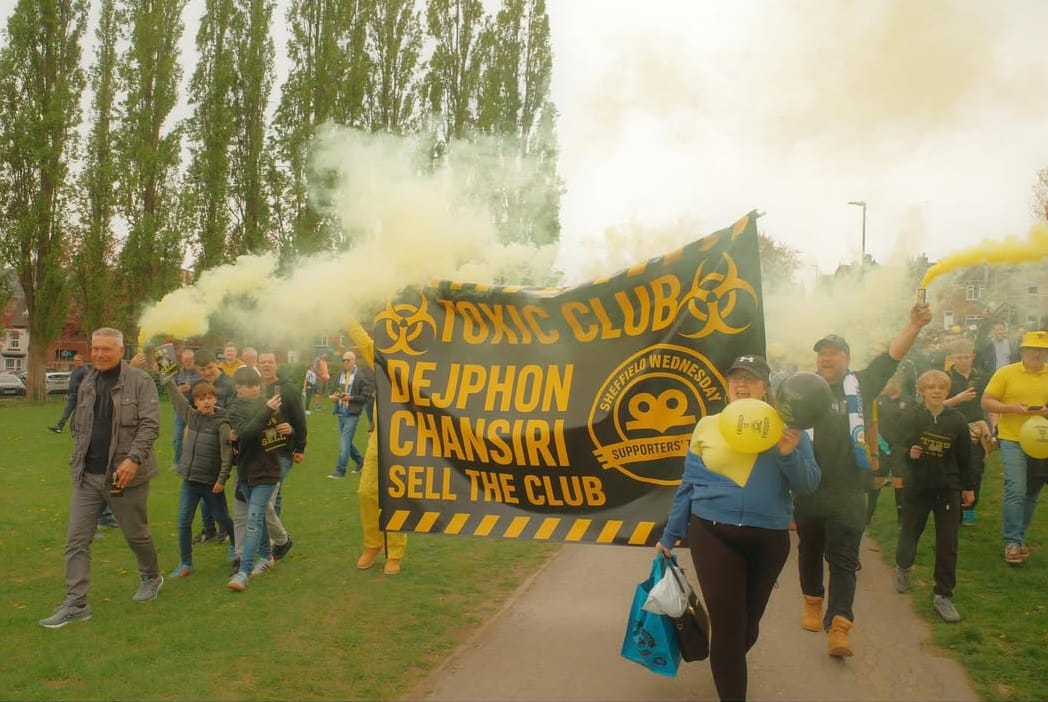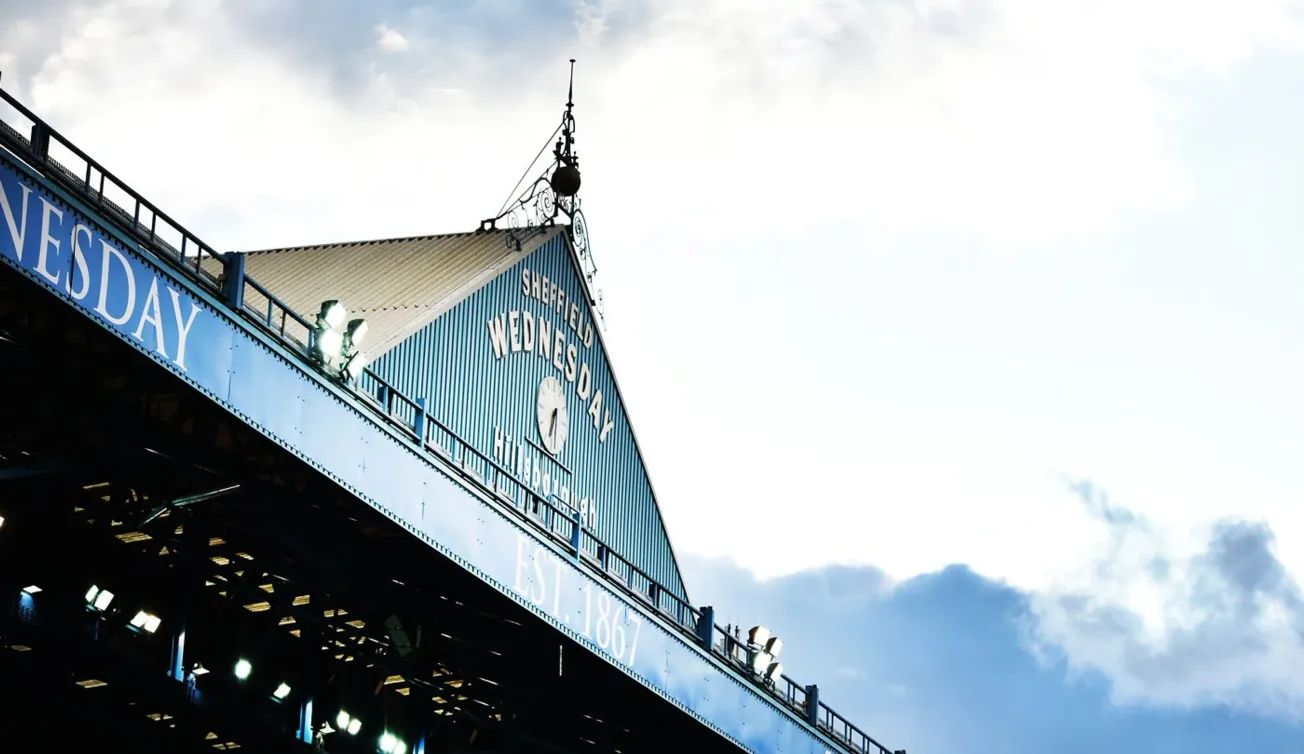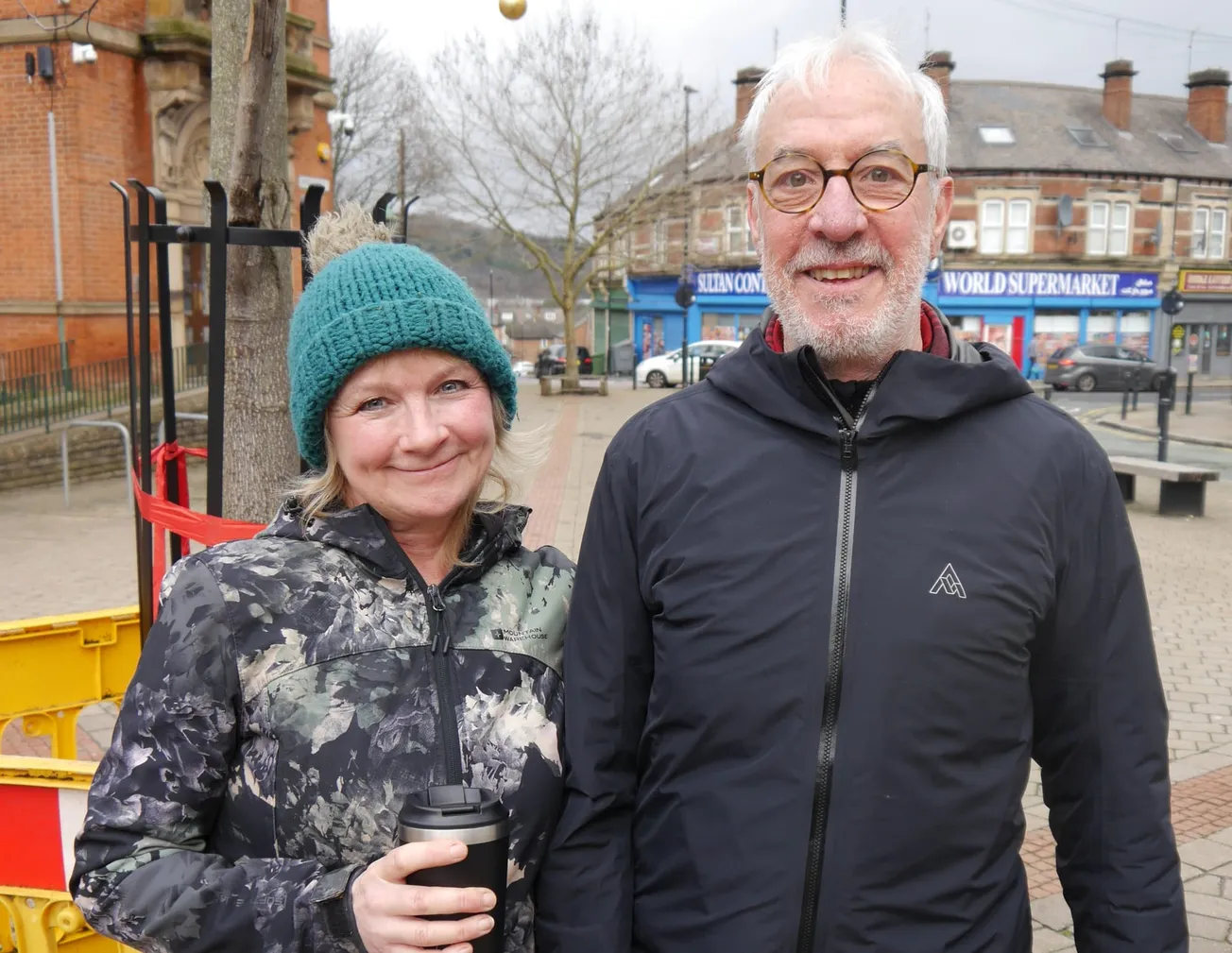Will Smith isn’t necessarily the kind of bloke I’d approach in a pub. Clad in blue from top to toe, ‘SWFC’ tattoos are etched into the parts of his skin on show, neck and hands inked up. Rolling up the sleeve of his Adidas tracksuit top, he shows me another, larger 'SWFC' tattoo on his forearm, and it’s accompanied by a massive Wednesday crest on his calf, surrounded by a flag design that’s half a Union Jack and half a St George’s Cross. To be frank, Smith looks like a hard case. But he’s great company. “Wednesday’s in me blood,” he tells me.
It’s Tuesday evening and I’m in The Riverside, a Wednesday supporters’ pub on Walkley Lane near Hillsborough corner. As I walk in I’m greeted by Owls banners on the ceiling and signed shirts on the walls. What The Riverside lacks though, is people. It’s been like this all season, sighs the barmaid. There’s only four customers. Will and his three companions, one of whom is a fellow Wednesday fan, another who is neutral, and John, a Barnsley fan who seems to have come in with the sole purpose of winding Will up. On multiple large screen TVs, Wednesday are playing Birmingham City away. They’re losing 1-0.
I ask Will what’s it like being a Wednesdayite at the moment, knowing full well the answer I’m going to get. “Fucking shit,” he laughs. The club is currently the poster child for badly-run football teams. Chairman Dejphon Chansiri hasn’t been able to pay his employees wages on time for five out of the last seven months, leading to the club being placed under a transfer embargo. Just this week it was reported that the team may have a points deduction imposed. Unsurprisingly, all this turmoil is affecting results on the pitch too, with the team languishing in the relegation zone of the Championship. “Half of them have walking sticks and the rest are in nappies,” adds Will, referring to the squad, which now has to draft in youngsters from the academy to be able to field a team.
The controversy surrounding Chansiri has left fans with a dilemma — do they go to the games, or not? Some are doing a complete boycott: refusing to watch the team play home or away until the owner exits the club. Others are still going to games but not spending any money on food or drink while they are in the stadium — the so-called “not a pound in the ground” campaign. Still more are refusing to buy merchandise in order to starve the ownership of another income stream, but others aren't doing anything, unpersuaded that any action taken by the fans will have any effect on the ownership. Division in the fanbase is rife.

Will is one of the full boycotters. This season is the first time he hasn't bought a season ticket in 35 years. Normally, he would also go to as many away games as he can, but he refuses to travel with the club while Chansiri is still in place. Pubs around Wednesday’s ground, like The Riverside, are normally rammed on matchdays, and busy for away games. But increasingly fans are staying home.
The saga is affecting Will’s mood. “I do get ratty,” he admits, when I ask about the emotional impact. He’s not alone. Football fans sometimes joke about their team affecting their mental health. But as sociologist and author David Goldblatt has argued, for fans, football clubs have huge emotional significance. They provide “a central source of identity, meaning, personal narrative that binds them to a wider community and that towns and cities embrace.”
Welcome to The Tribune. We’re Sheffield's long form newspaper, delivered by email. Sign up to our mailing list and get two totally free editions of The Tribune every week: a Monday briefing, full of everything you need to know about that’s going on in the city; and an in-depth weekend piece like the one you’re currently reading.
No ads, no gimmicks: just click the button below and get our unique brand of local journalism straight to your inbox.
Of course, people’s emotions going up and down with the fortunes of their club is normal. But this isn’t just a bad run of results. As fears have grown that the club might not survive, there’s an almost existential weight on some fans’ shoulders.
Popular fan account @1867News, posting on X/Twitter, recently lamented the outpouring of hopelessness they’ve seen from fans: “The number of tweets, DMs and texts I'm seeing where people say ‘This club is dead...I've lost my love for it...It's affecting my mental health...everything is just so depressing...I will not go again until he has gone’ is absolutely heartbreaking,” they wrote.

Underneath, fans underlined the original post’s point. “Went on Saturday, left at halftime completely broken by the whole situation. I’m done,” replied one fan. “I have no interest in the games any more. They’re a side show to everything that’s happening off the field. I used to be proud to be a Wednesdayite but now it’s just an embarrassment,” said another. “2025 has been the most depressing years the club has ever had. What’s the point in being a fan right now?” bemoaned a third.
Liam Laughton has been a member of the Sheffield Wednesday Supporters’ Trust for just over a year. Now 36, his first game was Manchester United in the 1996/7 season. Wednesday lost 1-0. However, hearing the Kop sing ‘Hi, Ho, Sheffield Wednesday’ for the first time made an indelible impression on him. “That was it, I was hooked,” he says.
Shortly after he joined the trust, Laughton became aware of some of the mental health problems arising from the club’s woes. “They were getting messages from people saying they are not sleeping, they’re not eating, spending more and more time online, arguing with the missus more,” he says. As a practicing mental health professional at an NHS trust, he offered to help.
The result of his work is a dedicated mental health hub on the supporters’ trust website, with advice for fans who are finding the ongoing saga overwhelming or upsetting. The hub contains a number of typical scenarios that fans might experience that try to get away from the medicalised language of depression. “We care deeply, but we cannot control what happens behind the scenes,” reads one. “Feeling stuck, angry or helpless is natural. If these feelings start to affect your day-to-day life, it might be time to reach out.” When I tell Laughton what Wednesday fan Will told me about the situation making him “ratty”, he says that’s exactly what they were trying to get at. “Most football fans aren’t going to come out and tell you they are feeling depressed, but irritability is one of the key signs of depression,” he says.

Laughton says for fans, the amount of headspace Wednesday is currently occupying is unusual. Football normally pauses over the summer, giving supporters the opportunity to think about other things, or get excited ahead of the new season. Instead, most of this summer has been spent worrying about the club’s future. Have people been paid on time? Has a winding up order been issued? Are we going to be liquidated? Is there going to be another transfer embargo or points deduction? “When it’s something you can’t control it makes it even more difficult,” he says. “You can’t just say, ‘well I’ll go to Bramall Lane instead’, can you?”
And as well as all the worries, fans breaking out of their routines by boycotting games could be damaging, he adds. Supporting a football team is all about rituals: walking through Hillsborough park, meeting your mates, going to the pub, getting a Béres hot pork sandwich. These are things that fans will have done for years, potentially decades. All of a sudden, that structure isn't there any more. “For many fans they live and breathe Sheffield Wednesday and it’s their release from the nine to five,” he says. “They might not be happy at work or in their relationships; but they get to go and see Wednesday play at the weekend and it brings a sense of relief. For others, it’s something they have always done. It’s what they do with their dad or their uncles and aunties, and where they have that family connection.”
Over the last 30 years, the way we think about football has changed out of all recognition. In the 1970s and 80s, the game was associated with hooliganism and violence. But it's now increasingly seen as one of the only environments where it’s socially acceptable for men to express emotions like joy, sadness and connection, emotions which they can often suppress due to societal norms around masculinity. Studies have found that football makes it easier for men to talk about their feelings, something they are traditionally far less likely than women to do.
Back at The Riverside, as I get another drink at the bar I speak to landlady Bev Griffin. She tells me that on home matchdays, normally The Riverside is standing room only, while on away matchdays it is generally busy with fans who haven’t made the trip, watching with fellow supporters. Bar takings on matchdays are currently down by 50%, a testament to a much-depleted communal experience for fans. “When the boycotts started I thought fans would still want to come and watch in the pub,” she says. “But they’re just staying at home.”

The boycotts themselves are becoming an extra source of stress and division, Laughton says. Some on social media have even invoked the language of the miners’ strike, calling fans who are ignoring the boycott and still going to games “scabs”. “Everyone is conflicted between what we want to do and what we should do at the moment,” says Laughton. “And whether it will make any difference.”
At Birmingham, Wednesday have turned it round and now lead 2-1, while on another television on the other side of the pub, on which United are playing, a 1-0 lead against Southampton at home has turned into a 2-1 deficit. As a result, Will’s mood had improved considerably. As we watch the final stages of the game, a man with a slick of sweat on his bald head walks in selling joints of beef and lamb out of a plastic bag. No one is buying.
As eight minutes of injury time ticks down agonisingly slowly, it looks like Wednesday are on course for just their second win of the season. But just as time is almost up, they concede a late equaliser and draw the game 2-2. Looking around at Will I expect despondency, but he is actually pleased with the result. A battling point from a young side against a decent Birmingham team is better than he expected. Equally importantly, on the other screen, United can't grab a late equaliser and lose 2-1, remaining one place behind Wednesday in the Championship.
It’s a balance that all Wednesday fans are having to strike at the moment: how to support a young team that is being put in an almost impossible position, while still fighting to get rid of the club’s intransigent owner. That tension is mirrored by another more personal one: between caring deeply about the club and looking after yourself at the same time. There is no right answer, just the hope that one day this will all be over. And Coventry this afternoon.
If you’d like to sponsor editions of The Tribune and reach over 30,000 readers, you can get in touch at grace@millmediaco.uk or visit our advertising page below for more information







